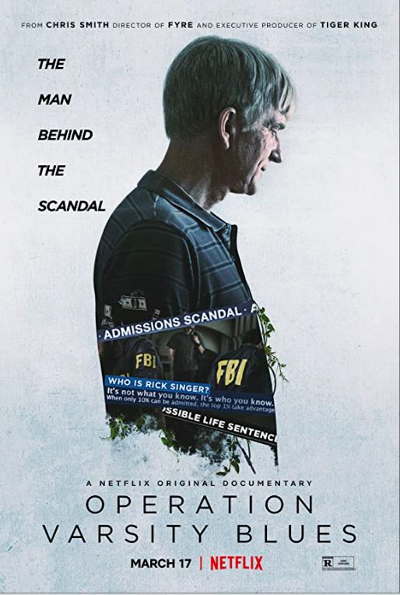Pressure and Prestige in Operation Varsity Blues



When I was in high school and applying to college more than twenty years ago (damn, I’m old!), I was guaranteed a spot in any Texas public school of my choice due to the Top Ten Percent rule. When I learned my class rank, I felt as though my academic work had paid off. When I filled out the Texas Common Application, I intellectually knew it was a formality. And yet, the whole college application process still seemed so intimidating to me, even with that guarantee. I was a first generation college student who felt overwhelmed filling out the FAFSA (Free Application for Federal Student Aid) for the first time. While I was awarded small federal grants due to my financial need, and I applied to every single scholarship I could, I still had to finance most of my undergraduate education with student loans (the scam of student loan debt is another post!). But at least I knew where I was going. And I had not dared to dream of going anywhere else. People like me, I had internalized, did not belong in and could not afford those fancy schools I only knew from shows on TV or from the T-shirts and sweatshirts of kids who seemed to know someone in, or who would soon become part of, the Ivy League world.
One day right after school and before we were supposed to be working on either copyediting submissions or the layout of our high school literary magazine, one of my fellow editors asked if we could drive to her house real quick because she wanted to know if her New York dream school’s (acceptance) letter had come in. We got in her car and pulled up to her mailbox in a matter of minutes. When she opened the mailbox we saw a few of those big and thick envelopes. For those of you who are much younger than I am, this is how high school students back then found out their fate; it wasn’t the click of a button, and we didn’t stream our reactions. We knew from the size of the envelope what the answer was. She had an acceptance letter and packet from her dream school. But the surprise really came from another big and thick envelope. This big and thick envelope was from Harvard. I remember us running in circles around her street corner yelling “I am going to Harvard!” and “She’s going to Harvard!” to no one in particular. It was a moment I felt lucky to share with her. There is no photographic or video evidence of this moment.
This memory came to me as soon as I started watching Netflix’s Operation Varsity Blues: The College Admissions Scandal. The opening scenes of this drama-documentary hybrid are those videos of students finding out, in front of their computers and surrounded by loved ones, if they got into their dream school. Sometimes I wish I had videos or photographs of special moments, but more often than not, I thank my lucky Texas stars that I did not come of age at a time when everything was documented and talked about online. I felt enough pressure trying to keep a high GPA so that I would not lose one of those spots in the top ten percent of my graduating class.
And pressure is what is often blamed for the college admissions scandal of 2019 in Operation Varsity Blues. The pressure to get into a top college. The pressure from parents who didn’t go to college, much less go to a dream school of their own. The pressure to take all the AP classes, get involved in the right and enough extracurriculars, and perform well on tests that measure test preparation (and family income) instead of intellect. I took the SAT my junior year, and though I could have taken it one more time, I felt such anxiety about it (though I didn’t know then to call it that), that I put all my eggs in the Top Ten Percent basket. My family could have never afforded the test prep that would have made me a more competitive college applicant. We definitely couldn't have paid for a counselor or consultant like those interviewed for Operation Varsity Blues. Families like mine didn’t even know these services and industry existed.
Rick Singer, the college “coach” and criminal “mastermind” of this scheme, is not the first name that most associate with the college admissions scandal. Sometimes I wonder if this story would have gotten as big as it did without its celebrity component. Though Felicity Huffman, William H. Macy, Lori Loughlin, Mossimo Giannulli, and Olivia Jade were not the most high profile of celebrities, they were well-known enough to make the news stories captivating to the general public. Without them, this story might have died down quickly or not even been noticed at all. Because, and maybe I’m too cynical for thinking this, what Rick Singer had done was not really scandalous at all. Buying your way into school is something that was and is still happening. The difference was that Rick Singer’s “side doors” were a less acceptable way of buying that seat at the Ivy and prestigious college table. Those side doors were illegal. But you can also buy your way out of illegal. And according to the wiretaps and others interviewed in Operation Varsity Blues, if your donation is big enough, admission can be guaranteed to the most prestigious of institutions.
Speaking of prestige, a little interesting moment in Operation Varsity Blues is when they critique the college rankings published by U.S. News & World Report. While apparently there are “17 measures of academic quality” which determine these rankings, those in the documentary argue that it is the unmeasurable quality of “prestige” which makes students and their parents do “whatever it takes” to get in. At one point a former admissions officer at Stanford explains that the traditional definition of the word “prestige” in French means “deceit,” which totally made my head explode because I rewatched Christopher Nolan’s The Prestige a few weeks/months ago and how could I not have made this connection before? These rankings in many ways are an illusion, and while some argue that this scandal pulls back the curtain on college admissions, some believe that this scandal has only made these selective colleges all the more alluring.
In the documentary (I feel silly calling it that, because the reenactments factor so much into this work), the talking head interviews with Rick Singer’s contemporaries and the author of a book about the scandal make the point to say that Singer was “slimy” or “fishy” from the moment he started his college “coaching.” But in all honesty, I wish Operation Varsity Blues had gone a little deeper on how the schemes that exist to get access to higher education go beyond a good old-fashioned bribe. The fact that there is an entire industry (test prep, “independent college counseling”) that provides higher education access to those with financial resources, and we still think of these admissions as having “merit”, is part of why this scandal will just remain a scandal, an anomaly, a momentary glimpse into a system that was started for and continues to serve (in its majority) to those with privilege. When that former admissions officer at Stanford said he would abolish standardized testing, if given the chance, I almost gave him a standing ovation. But it was Akil Bello who would earn my literal applause while watching this thing because he was the one dropping truths when he was featured. Once when he is pointing out how these families who had every advantage when applying to college still had to find slimier ways to so:
“...You have predominantly rich families who had every advantage that said they should be fine on the SAT, they’re gonna score in the highest demographic, they had all the prep in the world that they wanted, and yet they still cheated.”
And when he analyzed the role of Mark Riddell in this scandal, who sometimes is referred to as a “test-taking savant”:
“He's an adult who’s taking a test designed for 11th graders. Anyone worth their salt in the test preparation industry should be able to do what he did. The question is would they be willing to do it.”
I wish we had heard more from him, but I’ll just have to settle by following him on Twitter:
Yeah, #OperationVarsityBlues is #2 on Netflix.
— Akil Bello (@akilbello) March 22, 2021
It's an interesting profile on the worse of education but if you want real insight into college and education follow:@AcceptGroup @madinatoure @EricaLG @nikklani @nsh28 @mdawriter @jennthetutor @taraMaustin #Passthemic pic.twitter.com/V8SyIRnftX
There were other things I appreciated from watching Operation Varsity Blues. While I was skeptical of the reenactments in the trailer, and at times I wondered if they went on too long, the reenactments did eventually grow on me. I didn’t find them to be super cheesy, and because the only dialogue involved the text from the wiretaps, most of it felt natural. Most of the cringe came from the things parents got caught saying on tape about themselves or their children, like a mom who was concerned that one of her kids might have questions about taking a standardized test in a special location because they are not “as stupid” as their other kid who already went through Singer’s slimy process.
The reenactments (along with the interviews) also made it easier for me to understand how the athletic component of the scheme worked (that had been harder for me to follow in the articles that came out soon after the scandal became public), and how these smaller sports (that skew white and rich) would become the ultimate side door for Singer’s operation. It helped me understand how people in college athletics got involved with Singer, and it was how I learned that ultimately it was one of those coaches who brought the whole scheme down. It also gave me the chance to nerd out with one of my friends who was once a student athlete AND worked as an assistant coach for a college sport before she went back to school to become a badass historian and college professor.
Another thing I appreciated is that Operation Varsity Blues did not make a huge point to “humanize” Rick Singer, that it did not attempt to unearth the “reasons” in Rick Singer’s young life or past that “explain” why he became a scammer. I don’t need to feel sorry for this man or anyone involved in this whole operation...which does lead me to a moment at the end of the Operation Varsity Blues when someone says the parents are not really the villains of the story, but it is the system itself. And my response to that is…

Yes, the system is so messed up. Indicting these 50 people is really not fixing a problem that has been decades (and more, if you think of all of higher education’s history) in the making. But f the wiretaps are any indication, the only worry some of these parents seemed to have was that their children would fully understand their parents’ deception. They bribed Rick Singer and his associates by “donating” to a “foundation” that claimed to serve the underprivileged and underserved. This is awful, plain and simple.
But now I want to come back to the word “prestige.” Part of what the talking heads of Operation Varsity Blues try to argue at the end of the film is that these prestigious universities and their rankings do not mean much. That it is an illusion to believe that where you go to school matters. While I agree that college ranking is problematic as hell, the fact that these rankings are an “illusion” does not make them any less real. We’ve given these rankings meaning, so when a college graduate lists their alma mater on their resume for a job posting, we cannot deny that the names of some schools will carry more weight. And while Operation Varsity Blues makes the point that the parents bribing Singer were concerned with bragging rights in their circles, I believe their desire went beyond college admission as a status symbol. Attending prestigious institutions means access to networks of people and other institutions that sets people up, regardless of their field of “study” or “work.” I remember MANY years ago learning that Tommy Lee Jones and Al Gore were roommates in college and finding it amusing. The most recent pair of “celebrity” college roommates/friends I learned about was Ryan Coogler and Ludwig Göransson while watching the behind the scenes episode about the score of Disney’s The Mandalorian (an episode I am again rewatching as I type because, in trying to fact-check for this post, my kids begged me to watch it again all the way through. It’s their favorite). If the internet is to be believed, there are many other “celebrity roommates,” especially at prestigious institutions. And that’s without taking into account the roommate/fraternity/sorority connections of the unknown by the general public but who are truly wealthy and powerful.
For many students, the words “pressure” and “prestige” still come up even when they have already been admitted to the university of their choice. When I was a teaching assistant and then professor at a “prestigious” 4 year university, I often saw how much pressure the students still felt to get good grades to get into the “right” graduate school or professional program. I had many uncomfortable conversations with students who requested or fought for a grade change, not because the student saw evidence of a misgrade, but because this grade would affect their GPA, which would then affect the next step of their academic and career journey. Once, a student contesting a midterm exam grade aggressively and condescendingly came to my office to complain about the amount given to complete the midterm (which was not in my control), referred to my teaching subject as “not like it’s brain surgery” (maybe it was for him?), and demanded (without acknowledging the contradiction of his statement) that I “do what’s fair and bump up [his] grade.” While these types of conversations were not the majority of my student interactions in my office hours, they happened often enough and some were disrespectful enough that I can remember them word for word. Some I can remember not because the students displayed a sense of entitlement, but because the students broke down in my office from the pressure they were under (from their parents, their families, communities) to perform and excel in higher education.
Now that I teach at a community college, I don’t have as many conversations in which students contest grades. In fact, I feel that my role as an instructor in the community college classroom is often to build my students’ confidence as thinkers and writers and help them heal from some of the pain inflicted on them in the K-12 system. Which, finally, brings me to something I wish Operation Varsity Blues explored more--the students that I think are the true victims of Rick Singer’s (and others’) schemes. There were three moments that I wish had been given more time. The first was when it was claimed that Rick Singer’s first schemes involved mischaracterizing an applicant’s race or ethnicity for them to benefit from Affirmative Action. The second was when they explained how Singer exploited the accommodations available for students with disabilities. And the final one is when the FBI asks Singer to get parents to talk on the wiretap about his “foundation” which was for the benefit of “underserved kids.” I wish in all three cases that the interviewer had asked their “experts” to unpack how f*cked up it was for Singer and his co-conspirators to not only cheat the system but contribute to the narratives that damage Students who are Black, Indigenous or of Color, and/or those with learning differences and whose presence is often questioned and marginalized in “prestigious” institutions.
Ironically, students do not factor too much in Operation Varsity Blues, and now that I think about it, neither do teachers. We see glimpses of students in those college acceptance videos, but they get no dialogue in the reenactments (as their parents were the targets of the wiretaps), and seem to be ignorant (some willfully) about their parents’ plans. But I wish the documentary had not only given the obligatory Animal House ending to the “adults” in the scheme. I had to go look for some news stories to remind myself of the consequences faced by students involved in this scandal. But it tracks that students (and teachers) are not really the stars of this operation. Because the ways the wealthy get into prestigious U.S. universities have nothing to do with learning or education at all.
